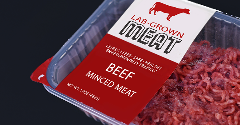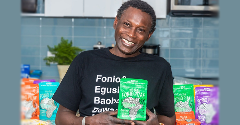News
‘Climatarian’ consumers centre sustainability in food choices
9 Nov 2023The climate is a growing concern for consumers when they choose what type of diet to follow and which food products they buy, according to recent data from packaging giant Tetra Pak.
These environmentally conscious “climatarians” are showing brands that “personal and planetary health [is] now increasingly linked in the mind of the consumer”, Tetra Pak said.

In the Tetra Pak Index 2023 report, 54% of survey respondents said they consider the future of the planet when making food choices, and 70% said that healthy products shouldn’t harm the environment.
“This dual focus is reflected in the rising number of consumers consciously reducing the amount of meat they eat, known as 'flexitarians', with nearly half of all consumers saying they are reducing meat intake or excluding meat altogether,” Tetra Pak said.
Going meatless is going global
Many consumers are choosing to reduce meat in their diets for a variety of reasons. Meat production is harmful to the environment and is significantly contributing to the worsening climate change crisis.
There have also been major improvements to the taste and quality of mainstream vegan and vegetarian food options in restaurants and grocery stores, making it easier for people to make meat-free choices.
The inclination to eat less meat is not only restricted to western markets. The Tetra Pak survey was conducted in 10 countries around the world and found that meat reduction is a “global phenomenon.”
For survey respondents that follow a flexitarian, pescatarian, vegetarian or vegan diet, 56% cited their health and 36% cited the environment as their primary reason.
 © AdobeStock/myboys.me
© AdobeStock/myboys.me
“There is continued high interest in organic and natural food, and almost half of consumers now strive to be flexitarian or to exclude meat altogether. While in some cases, higher price points have cooled the demand for plant-based protein alternatives, the longer-term forecasts for such products remain strong,” said Adolfo Orive, president and CEO of Tetra Pak.
A need for resilient and sustainable food systems
Consumers are willing to go the extra mile for their preferred choices, with 70% of survey participants saying that they would sacrifice convenience for healthier products. And even though 49% said they are struggling financially, only 17% said they would give up products that are environmentally friendly, healthy, or organic just because they cost more.
“The findings of this year’s Index are reflective of the direction we have taken in the last few years, to decarbonise the food industry and make food systems more resilient and sustainable,” Orive said.
Tetra Pak said this new research will help inform its plans for optimising the food and beverage value chain with innovations in sourcing, packaging, processing and distribution. That includes using renewable or recycled materials that have a low carbon impact, are recyclable and help reduce food waste.
“Considering that the world will need 60% more food by 2050, we are complementing these efforts through technologies that can help explore new sources of nutrition – ranging from new plant-based sources to alternative proteins produced with biomass and precision fermentation. Both these areas are critical to contribute towards food system sustainability,” Orive said.
Related news

Israel approves Aleph Farms’ cell-cultured beef in world first
1 Feb 2024
Israel has granted the first regulatory approval for the commercial sale of cultivated beef, joining the US and Singapore in officially recognising cultivated meat’s role towards protein diversification.
Read more
Fazer and Solar Foods launch snack bar made with air protein
30 Jan 2024
Finnish food manufacturer Fazer has teamed up with foodtech startup Solar Foods to launch a limited-edition snack bar in Singapore made using a novel, carbon-fed microbial protein.
Read more
Big brands invest in precision fermentation-derived palm oil
25 Jan 2024
Although still not approved for food applications, big brands such as Unilever and Doehler are investing in precision fermentation-derived palm oil in a bid to reduce the environmental impact associated with this conventional palm oil.
Read more
Supergrain fonio expands its reach in US market
11 Jan 2024
More US consumers will find nutritious, climate-smart grain fonio in supermarkets thanks to a new distribution structure for the import’s most prominent commercial brand, Yolélé.
Read more
Sustainability meets innovation at Fi Europe 2023's Sustainability Ingredients Zone
9 Jan 2024
Fi Europe’s Sustainable Ingredients Zone showcases ingredients forging a path toward a greener future. Three innovators are redefining what sustainability within the food and beverage industry means, with upcycled products, regenerative agriculture, an...
Read more
Supermarkets innovate with private label plant-based ranges
9 Jan 2024
Plant-based product ranges are an important part of retailers’ private label innovation efforts – and represent an important way for supermarkets to reduce their environmental impact.
Read more
The UK prepares to open food security science centre
2 Jan 2024
Amid global food insecurity, the UK government says it is committed to producing crops resilient to climate change and addressing hunger and malnutrition with a food security science centre.
Read more
Novel food safety platform could eliminate animal testing
21 Dec 2023
The European Food Safety Authority (EFSA) has introduced a new platform that has the potential to eliminate animal testing in the food industry.
Read more
Water-conscious consumers, upcycled food, and tech-driven sustainability: Highlights from Fi Europe, part 2
14 Dec 2023
With climate change becoming a tangible reality, consumers’ environmental concerns are changing. At Fi Europe, market analysts revealed how people are now interested in everyday issues like water shortages and tech-driven solutions such as GM drought-r...
Read more
The food industry’s single-use packaging problem
12 Dec 2023
The food industry’s reliance on single-use packaging is a sustainability “sticking point” with viable alternatives not widely available – but new EU rules mean food businesses will remain responsible for the collection and disposal of the packaging the...
Read more